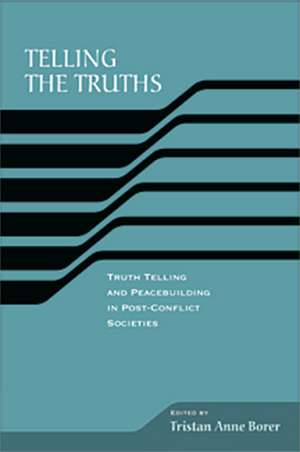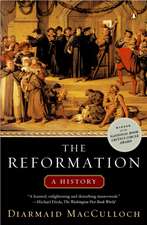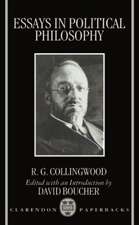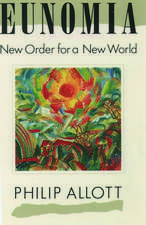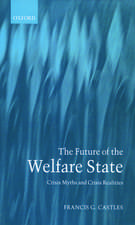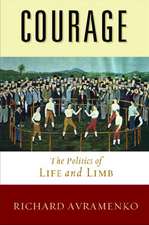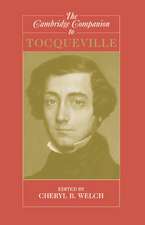Telling the Truths – Truth Telling and Peace Building in Post–Conflict Societies: RIREC Project on Post-Accord Peacebuilding
Autor Tristan Anne Boreren Limba Engleză Hardback – 21 dec 2005
| Toate formatele și edițiile | Preț | Express |
|---|---|---|
| Paperback (1) | 276.73 lei 43-57 zile | |
| MR – University of Notre Dame Press – 21 dec 2005 | 276.73 lei 43-57 zile | |
| Hardback (1) | 590.28 lei 43-57 zile | |
| MR – University of Notre Dame Press – 21 dec 2005 | 590.28 lei 43-57 zile |
Preț: 590.28 lei
Preț vechi: 766.59 lei
-23% Nou
Puncte Express: 885
Preț estimativ în valută:
112.95€ • 118.24$ • 93.46£
112.95€ • 118.24$ • 93.46£
Carte tipărită la comandă
Livrare economică 07-21 aprilie
Preluare comenzi: 021 569.72.76
Specificații
ISBN-13: 9780268021962
ISBN-10: 0268021961
Pagini: 328
Dimensiuni: 152 x 229 x 19 mm
Greutate: 0.55 kg
Ediția:1
Editura: MR – University of Notre Dame Press
Seria RIREC Project on Post-Accord Peacebuilding
ISBN-10: 0268021961
Pagini: 328
Dimensiuni: 152 x 229 x 19 mm
Greutate: 0.55 kg
Ediția:1
Editura: MR – University of Notre Dame Press
Seria RIREC Project on Post-Accord Peacebuilding
Recenzii
“This collection demonstrates that scholarship of transitional justice and truth-telling structures is reaching a new stage of maturity. This interdisciplinary group of scholars and practitioners confront and problematize a number of aspirational assumptions found in the discourse between both scholars and policy-makers about the utility of truth commissions. The authors explicitly question the value of truth telling for countries emerging from protracted conflicts, call for modest expectations of any single attempt to hasten reconciliation, and present nuanced interpretations of the complexities of truth telling and peace building. . . . These authors discuss cases and raise questions and hypotheses that can inspire a new research agenda into the relationship between truth and peace.” —Human Rights and Human Welfare (2006)
"This is a specialized volume that furthers the development of the interdisciplinary field of peace studies, and belongs in most university libraries. . . In an insightful introductory chapter, she lays out the research challenges in looking at truth telling as a peace-building activity, and then examines empirical evidence in case studies across the globe. . . With contributors from around the world and from several disciplines, the volume seeks to weigh truth telling as part of the restorative justice process and to document that peace building involves long-term processes." —Choice (November 2006)
“The volume's objective, as editor Tristan Anne Borer states in her introduction, is to examine 'whether truth-telling mechanisms can contribute to sustainable peace, and, if so, how and under what conditions.' It is a welcome aim. Neither the post-conflict peace-building literature nor the transitional justice literature has rigorously and systematically examined that relationship. . . . Borer's introduction stands out as one of the better chapters, providing a solid overview of the literature, and a lucid discussion of key conceptual and definitional issues.” —Political Science Quarterly, Summer 2007
Notă biografică
TRISTAN ANNE BORER is associate professor of government at Connecticut College.
CONTRIBUTORS: Tristan Anne Borer, Charles Villa-Vicencio, Jennifer J. Llewellyn, Juan E. Méndez, Debra L. DeLaet, Pablo De Greiff, Brandon Hamber, David Becker, and Shari Eppel.
Descriere
"Truth telling is always important but never more so than when a country undergoes a transition. Getting to the truth challenges myths, half-truths, denials, and lies. When the silence is broken, it offers the opportunity for new beginnings. Telling the Truths is a major step in this direction." —Alex Boraine, Founding President and Chairperson of the Board, International Center for Transitional Justice, Cape Town, South Africa
"This interesting, well-written book is timely and important for scholars of democratic transitions and conflict resolution as well as those working in the areas of international law and organization." —Jackie Smith, Department of Sociology and Joan B. Kroc Institute for International Peace Studies, University of Notre Dame
Confronting the past has become an established norm for countries undergoing transitions from violence to peace, from authoritarianism to democracy, or both. This book draws from two bodies of literature—peace building and transitional justice—to examine whether truth-telling mechanisms can contribute to sustainable peace and, if so, how and under what conditions. The authors approach these questions by examining whether truth telling contributes to the following elements, all of which are deemed to be constitutive of sustainable peace: reconciliation, human rights, gender equity, restorative justice, the rule of law, the mitigation of violence, and the healing of trauma.
While the transitional-justice literature appears to have grasped the importance of truth telling for securing sustainable peace, few studies have undertaken empirical analysis and evaluations of the long-term impact of such mechanisms. Contributors to this interdisciplinary volume—from the fields of political science, law, anthropology, psychology, philosophy, and theology—accomplish that by closely examining how societies emerging from violence must in some way examine, acknowledge, and account for violence committed in the past in order to move forward.
